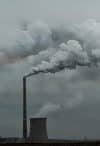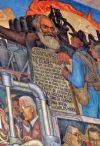Global

Metabolic rift theory can deepen our understanding of the human microbiota—organisms living on and inside of humans—and the ways that capitalism has disrupted these microbial ecosystems, with serious consequences for our health. | more…

A Metabolic Analysis of Nutrient Loading
Increasing rates of nitrogen and phosphorus application have caused severe damage to aquatic systems, as rivers, streams, lakes, bays, and ocean systems have been inundated with nutrient runoff. Only by addressing the metabolic rupture in the soil nutrient cycle and the contradictions of capital can we begin to mend these land–sea rifts. | more…

Against attempts to characterize Marx as a dogmatic and deterministic thinker, it is precisely the open-endedness of his criticism that accounts for historical materialism’s staying power. This openness has allowed Marxism to continually reinvent itself, expanding its empirical and theoretical content and embracing ever larger aspects of historical reality. | more…

The Manifesto‘s analysis of the capitalist crises that “put on its trial, each time more threateningly, the existence of the entire bourgeois society” remains central to any attempt to predict the events of the coming years. | more…

Human economies are complex biophysical systems. By exploring some fundamental concepts in physics, we can develop a better understanding of the ways that the energy-intensive activities of capitalism are changing humanity and the planet. | more…

From call centers to fast-food restaurants, the future of service work is one of precarious employment, with no stable schedules, wages, benefits, or union representation. Should these workers be considered part of a new service proletariat, or treated as a new class altogether, the “precariat”? | more…

The Marxian critique of political economy is inseparable from the “labor theory of value.” But what exactly does this theory mean? This article considers Marx’s value theory from five perspectives: as a monetary value theory, a theory of exploitation, a macro-monetary theory of capitalist production, a theory of individual prices, and a theory of crises. | more…

For several decades, intellectuals and economists who follow Marxist theory have hotly debated the financialization of capitalism. François Chesnais’s latest book represents the most thorough and polished attempt yet to clarify several lingering questions around the matter. | more…

Kohei Saito’s Karl Marx’s Ecosocialism: Capitalism, Nature, and the Unfinished Critique of Political Economy shows convincingly that Marx’s ideas about the interaction between humanity and nature did not arrive fully formed, but arose from his rigorous engagement with science and philosophy. His insights still offer unparalleled tools to understand capitalism’s current assault on the environment. | more…

Unlike such obvious forms of oppression as feudalism or slavery, capitalism has been able to survive through its genius for disguising corporate profit imperatives as opportunities for individual human equality and advancement. But it was the genius of Karl Marx, in his masterwork, Capital, to discover the converse law of surplus value: behind the illusion of the democratic, supply-and-demand marketplace, lies the workplace, where people trying to earn a living are required to work way beyond the time it takes to pay their wages. Leave it to the genius of Samir Amin to advance Marx’s theories—adding to them the work of radical economists such as Michal Kalecki, Josef Steindl, Paul Baran, and Paul Sweezy—to show how Marxian theory can be adapted to modern economic conditions. | more…

To understand the present ecological crisis, it is necessary to dig much deeper into capitalism’s logic of expropriation, as first delineated by Marx during the Industrial Revolution. At the root of the problem is a spoliation of the natural environment—the expropriation of the earth itself. | more…

How Capital Extracts Value Beyond Wage Labor
An expanded Marxist understanding of capitalist exploitation is long overdue. There are many pathways of surplus extraction beyond the wage form, and understanding them is a task with profound implications for anticapitalist movements around the world. | more…











